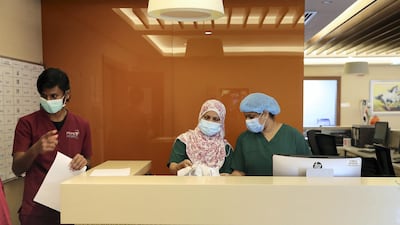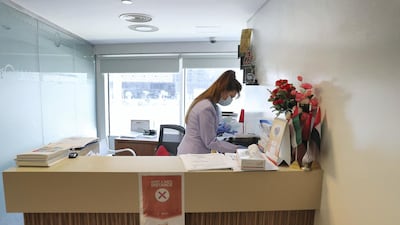At first, doctors tried everything to counter symptoms of Covid-19.
From antimalarial medicine to HIV drugs and anti-inflammatory medication for arthritis, medics gave severely ill patients a cocktail of pills to help them survive.
Now, eight months after the outbreak began, medics have a far clearer picture of how to manage symptoms that can swing so dramatically between cases.
On an almost daily basis, new information from around the globe either confirms hunches, or throws doubt on treatment plans.
With a vaccine still months away, shared experiences from the front line have proven to be the most effective approach towards coronavirus care.
At the height of the pandemic, internal medicine specialist Dr Faisal Dalvi had 40 patients with coronavirus under his care at Burjeel Hospital in Abu Dhabi, several in a critical condition.
Although the hospital is now free of Covid-19 patients, his experience has left the medical centre in a far better position to deal with cases should they arise.
“Initially we were very naive as the virus was so new,” said Dr Dalvi.
“Guidelines published by Dubai Health Authority and the Department of Health were updated every week as more was learnt about the virus.”
The use of antiviral medication proved the biggest breakthrough, although the efficacy of drugs such as remdesivir, used in the treatment of US President Donald Trump, has since been placed in doubt.
“When we did an X-ray on patients, we found the virus had targeted the lungs in most of them so they developed bilateral pneumonia,” said Dr Dalvi.
“I was using [malaria medicine] hydroxychloroquine and Kaletra, a combination of HIV drugs lopinavir and ritonavir.
“They did not allow the virus to replicate so it would not be as severe in the lungs. None of my patients died.”
A combination of antibodies to make the virus more visible to the immune system was another tool at the disposal of medics.
Monoclonal antibody therapy copied the natural immune response, attaching to the virus to prevent it penetrating the body’s cells.
Trump drug remdesivir has 'little to no effect'
Antiviral drug remdesivir was also used in the treatment of Ebola and showed a similar ability to cut the duration of coronavirus symptoms from 15 days to 11.
Despite that success, a World Health Organisation study of 11,266 patients from 500 hospitals in 30 countries found remdesivir had little to no effect on survival rates in seriously ill Covid-19 patients.
Despite the varied techniques used to treat the most seriously ill patients, many hospitals triaged coronavirus patients using similar protocols.
“With regards to lines of treatment, there is no big change in what we were doing in March compared with now,” said Dr Adel Al Sisi, a critical care consultant at Prime Hospital in Garhoud.
The hospital took on many Covid-19 patients in April but is now free of cases.
"There is a group of medicine we could use. Some are being used more now than others were in March but it is always changing," he said.
“The information we have is only a suggested course of action to give the best patient care.
“By following this, we aim to relieve symptoms, minimise the length of hospital stay and reduce mortality.”
Patients testing positive for the virus were placed into five categories and treated accordingly.
Stabilising the organs
Category one patients were asymptomatic; category two had mild symptoms; category three were declared moderate; category four were severe; and category five was for those in a critical condition.
Those in category one and two were sent home to quarantine for 14 days.
While those with mild symptoms were sent into isolation with cough medicine or paracetamol to treat body aches and fever, others required more invasive therapies.
“Stabilising a patient’s organ function early on was critical in the most severe cases,” said Dr Al Sisi.
“This was done via a variety of treatments, including broad spectrum antibiotics, blood thinners and other anticoagulant therapies.”
Dexamethasone was a steroid commonly used by doctors because it calmed the immune system. But using it too early could impair the body’s natural ability to fight off the virus.
“This group of antiviral medications were studied in the early days of coronavirus once there was a common pool of patients,” said Dr Al Sisi.
“Research was initiated very quickly and their outcomes closely monitored. This was done worldwide and the results shared widely.
“The positive results encouraged the use of these drugs in the early stages.”
So far, the UAE has reported more than 117,000 cases of the virus, with more than 40 million recorded worldwide.
Dr Brijesh Bhardwaj, department head and an internal medicine specialist at NMC Royal Hospital in Dubai Investments Park, said medics quickly learnt how ventilators could be used more effectively.
“Although we are not getting patients at the hospital, we have developed a proper understanding of the illness,” he said.
“This makes the treatment we can give patients more precise.”
That treatment now includes prone ventilation. Supplying oxygen to patients lying face down proved more effective in the most severe cases because it improves oxygenation when compared with more traditional modes of supported breathing.
Doctors at NMC said they also found success treating the virus with immunosuppressive drug tocilizumab, more commonly used for arthritis in children.
Other anti-inflammatory drugs and antiviral medication were also successful, they said.
"Without proper oxygenation we knew they would eventually die," said Dr Dalvi.
“Prone ventilation for patients in intensive care was much more successful, and this was only something we learnt from treating more patients with the virus.
“Keeping them lying down for 15 to 16 hours allowed them to absorb more oxygen.”
An injection of low molecular weight heparin to prevent blood clots in the lungs was another breakthrough in reducing the number of deaths.
“Cases are rising again but we are better prepared now, if required, with what we have learnt,” said Dr Dalvi.












